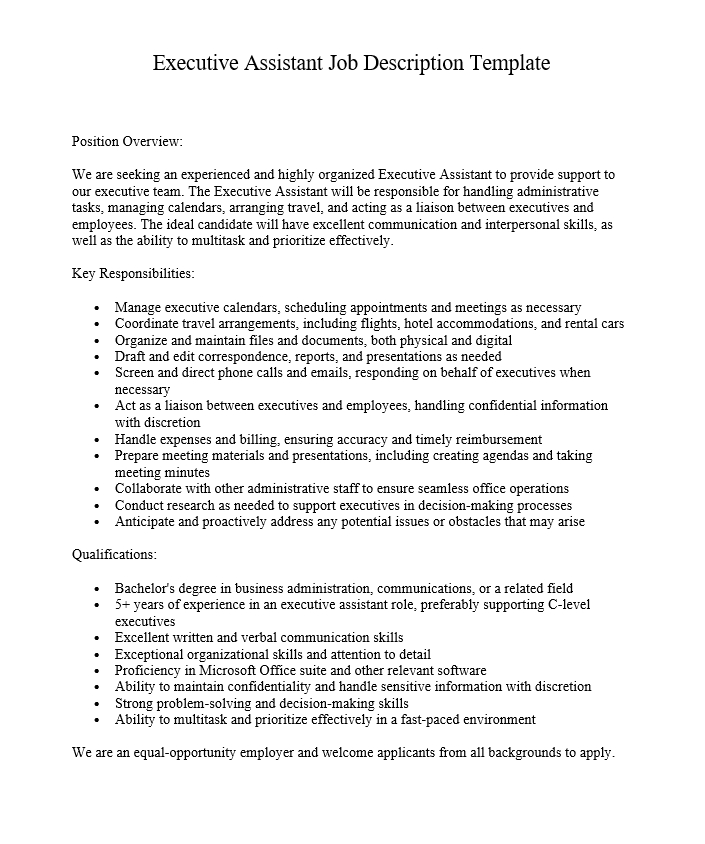The Ultimate Guide to Executive Assistant Job Description: Roles, Responsibilities, and Requirements
The role of an executive assistant is to provide support to senior-level management and help them to carry out their duties effectively. They act as a liaison between the executive and other members of the organization and are responsible for managing a wide range of tasks, including:
- Administrative Duties
- Communication and Correspondence
- Calendar Management and Scheduling
- Travel Arrangements
- Meeting Preparation and Support
- Information Management
- Project Management
- Event Planning

Executive Assistant Responsibilities
1. Administrative Duties: Executive assistants are responsible for managing a wide range of administrative tasks, including:
- Answering phone calls
- Responding to emails
- Preparing reports and presentations
- Filing and organizing documents
- Managing databases
2. Communication and Correspondence: They act as a liaison between the executive and other members of the organization, and are responsible for:
- Drafting and responding to emails
- Preparing and editing documents
- Managing communication channels
3. Calendar Management and Scheduling: Executive assistants are responsible for managing the executive’s calendar and scheduling appointments and meetings, both internally and externally.
4. Travel Arrangements: They are responsible for making travel arrangements for the executive, including booking flights, hotels, and transportation.
Meeting Preparation and Support: They are responsible for preparing meeting agendas, taking minutes, and ensuring that all attendees have the necessary information and materials for the meeting.
5. Information Management: They are responsible for managing and organizing information, including files, documents, and databases.
6. Project Management: They may be responsible for managing projects on behalf of the executive, including planning, organizing, and coordinating project activities.
7. Event Planning: They may be responsible for organizing and coordinating events, including conferences, meetings, and other gatherings.
Executive Assistant Requirements and Skills
1. Educational Requirements: A high school diploma is typically required, although some employers may prefer candidates with a bachelor’s degree in a relevant field.
2. Experience Requirements: Experience as an administrative assistant or in a related field is typically required, although some employers may consider candidates with no experience if they have the necessary skills and education.
3. Technical Skills: Executive assistants should be proficient in:
- Microsoft Office, including Word, Excel, PowerPoint, and Outlook
- Other relevant software programs
4. Soft Skills: They should have excellent:
- Communication and interpersonal skills
- Organizational and time-management skills
5. Interpersonal Skills: They should be able to:
- Work well under pressure
- Multitask
- Have a professional demeanor and appearance
Position Overview: We are seeking an experienced and highly organized Executive Assistant to provide support to our executive team. The Executive Assistant will be responsible for handling administrative tasks, managing calendars, arranging travel, and acting as a liaison between executives and employees. The ideal candidate will have excellent communication and interpersonal skills, as well as the ability to multitask and prioritize effectively. Key Responsibilities: Qualifications: We are an equal-opportunity employer and welcome applicants from all backgrounds to apply. Executive Assistant Job Description Template
Q: What does an executive assistant do?
A: An executive assistant provides high-level support to senior-level management, including administrative tasks, communication and correspondence, calendar management and scheduling, travel arrangements, meeting preparation and support, information management, project management, and event planning.
Q: What are the educational requirements for an executive assistant job?
A: A high school diploma is typically required, although some employers may prefer candidates with a bachelor’s degree in a relevant field.
Q: What experience is required for an executive assistant job?
A: Experience as an administrative assistant or in a related field is typically required, although some employers may consider candidates with no experience if they have the necessary skills and education.
Q: What technical skills are required for an executive assistant job?
A: Executive assistants should be proficient in Microsoft Office, including Word, Excel, PowerPoint, and Outlook, as well as other relevant software programs.
Q: What soft skills are required for an executive assistant job?
A: Executive assistants should have excellent communication and interpersonal skills, as well as organizational and time-management skills.
Q: What interpersonal skills are required for an executive assistant job?
A: Executive assistants should be able to work well under pressure, multitask, and have a professional demeanor and appearance.
Q: How can I become an executive assistant?
A: To become an executive assistant, you should have a high school diploma and experience as an administrative assistant or in a related field. A bachelor’s degree in a relevant field may also be preferred. Additionally, you should have the necessary technical and soft skills to be successful in this role.
Q: What is the salary range for an executive assistant?
A: The salary range for an executive assistant can vary depending on factors such as experience, location, and industry. According to Glassdoor, the national average salary for an executive assistant is $59,000 per year in the United States.
Q: What industries hire executive assistants?
A: Executive assistants are employed in a wide range of industries, including finance, healthcare, technology, law, and non-profit organizations.
Q: What are some tips for being a successful executive assistant?
A: To be a successful executive assistant, you should have excellent communication and organizational skills, be able to work well under pressure and have strong attention to detail. Additionally, you should be proactive, anticipate the needs of the executive, and be able to prioritize tasks effectively. Finally, maintaining a professional demeanor and appearance is also important.